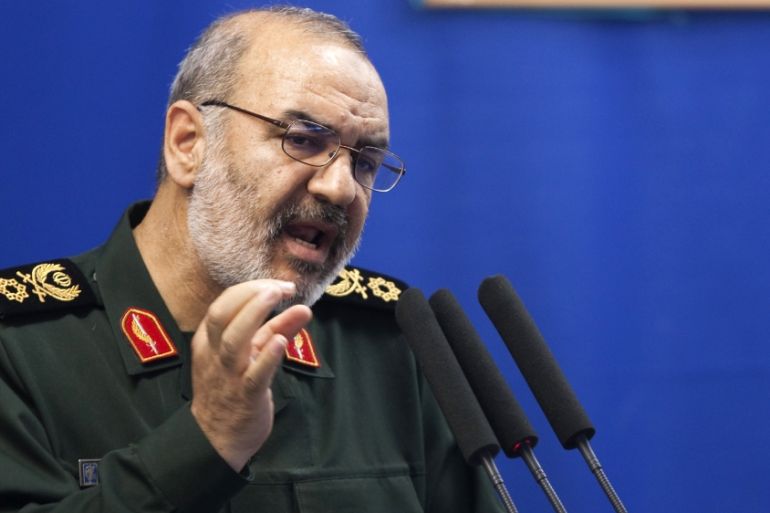Iran Guard: Fear of war makes US focus on economic conflict
Tehran has ‘closed the path’ militarily, leaving Washington to pursue economic war, Revolutionary Guard’s chief says.

The head of Iran‘s elite Revolutionary Guard said the United States is worried about the prospect of war with Iran and has instead pursued an economic conflict.
Major-General Hossein Salami on Wednesday said Iran had “completely closed the path for the enemy” in the military sphere, Iran’s Fars news agency reported.
Keep reading
list of 4 itemsMexico to Iran, why are attacks on embassies so controversial?
US sanctions shipping firm accused of links to Iran, Yemen’s Houthis
US sends 1.1 million rounds of seized Iranian ammunition to Ukraine
“In the current situation it is the enemies who are worried about the outbreak of war and this worry is apparent in their physical and tactical behaviour… At the current crossroads, economic war is the main field for the enemy to confront us,” he said.
Tensions have soared between Washington and Tehran since President Donald Trump pulled Washington out of a nuclear deal last year and reimposed sanctions on Tehran in a bid to reduce international sales of Iranian oil to zero.
The US has since accused Iran of carrying out attacks on six tankers in the Gulf over the past two months, which Tehran has denied.
Last month, the prospect of a direct military confrontation between the rivals arose, after Iran shot down a US drone it said had violated its airspace. The US, which said the drone was in international airspace at the time it was struck, aborted a retaliatory air raid, with Trump saying it would have killed too many people.
Hesamodin Ashena, President Hassan Rouhani’s adviser, warned Trump against listening to hawks in his administration, hinting aggression against Iran could make him a “one-term president”.
“We have unseated an American president in the past, we can do it again,” he tweeted, referring to Jimmy Carter whose bid for a second term was marred by the Iran hostage crisis in 1980.
Uranium enrichment
Separately, Rouhani said the country would soon exceed the uranium enrichment limit it agreed in its 2015 nuclear deal with world powers.
“On July 7, our enrichment level will no longer be 3.67 percent. We will put aside this commitment. We will increase [the enrichment level] beyond 3.67 percent to as much as we want, as much as is necessary, as much as we need,” Rouhani said during a cabinet meeting on Wednesday.
|
|
Rouhani stressed Iran’s action would be reversed if the other parties to the nuclear deal made good on their side of the bargain – relief from sanctions.
“We will remain committed to the [nuclear deal] as long as the other parties are committed. We will act on the JCPOA 100 percent the day that the other party acts 100 percent [too],” he said.
Rouhani said Iran would also deliver on its threat to resume construction of a heavy water reactor after July 7 and would bring it to the condition that “according to you, is dangerous and can produce plutonium”.
He added the measures could be reversed in “hours” if the other parties “live up to their commitments”.
Al Jazeera’s Zein Basravi, reporting from Tehran, said Iran’s latest steps were “designed to retake control over its nuclear programme”.
“What the world leaders are hoping is that Iran decides not to do so. Iranian leaders have said over and over again that they have been patient enough and it’s now time to do what they think is best for their country,” he said.
Iran has sought to pressure the remaining signatories – China, France, Germany, the United Kingdom and Russia – to save the deal.
The European Union has moved to salvage the deal by setting up a payment mechanism known as INSTEX, designed to help Iran skirt US sanctions, which became operational last week.
But Rouhani has dismissed the mechanism as “hollow”, saying it was useless to Iran because it failed to provide for the financing of purchases of Iranian oil.